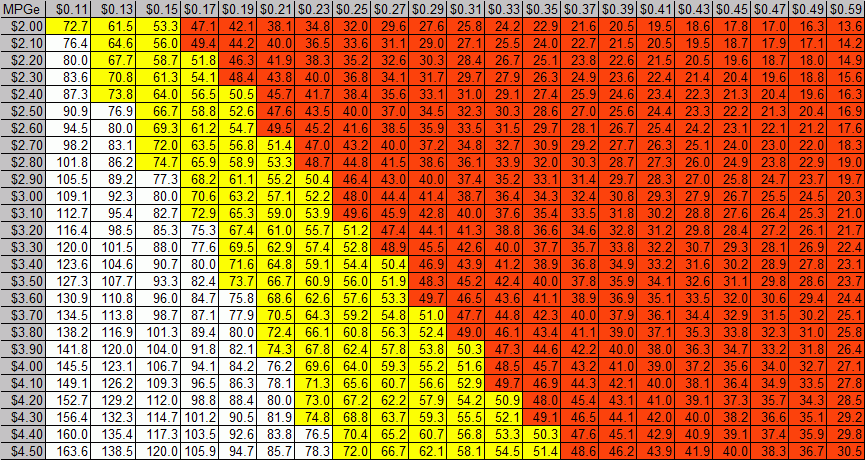Nashco said:
SparkevBlogspot said:
But your mi/kWh is wrong. What's reported by the car assumes 100% efficiency in charging.
No, it's NOT wrong, just displaying different data than you wish it displayed.
It is WRONG regard to actual MPGe that matter, which is what comes out of your pocket. My point is MPGe we discuss should be about real money, not some nebulous quantity.
Nashco said:
The same goes for any gas car...the car's display only tells you MPG as estimated by the fuel injected into the engine and the miles driven, it doesn't account for evaporation, spillage at the pump, etc. that are a normal part of driving and vary greatly depending on the operating conditions.
Evaporation, etc for gas car does not account for 20% loss, not even 5%. Comparing that to EV charging loss is BS, more ammo for gasbags.
Nashco said:
I've had my car for a year and a half and I assure you that I've driven it in more extreme conditions than you ever will (unless you also race your Spark EV

).
I'm not questioning whether you know your EV. But using display data is just WRONG in making MPGe determination. Most extreme I drove was with AC / heat going up 2000 ft. in freeway. I got bit over 3 mi/kWh displayed; I did not measure charging, but I wouldn't use that number any more than 10 mi/kWh I got going back home as displayed by the car. They have to scale (lower) to account for charging.
Nashco said:
I charge with L2 or with CCS. Charging efficiency with L2 is about 88% and about 78% with L1, no idea where you're getting 80% with L2 or 70% with L1. CCS is even more efficient (90%+) but that's been more difficult data to get with the Spark EV.
You can work with best case numbers (and get disappointed) or typical or worst case (and get elated when it turns out better). I got around 80% L1 charging when car is new. I haven't done so lately, but I suspect that could go down in time as battery ages. How low? Hard to say, but I throw out 70% as very pessimistic number.
http://sparkev.blogspot.com/2015/05/spark-ev-efficiency.html
Nashco said:
costs, but in reality there's another variable...actual mi/kWh. It's your chart, so you can do what you want with it, I was just giving some feedback at the hangup I had (scale is skewed to very high energy prices and assumes a fixed efficiency).
I say this explicitly: I don't want people to plug in the WRONG number (ie, displayed number) and get false sense of "wow, SparkEV gets 123 MPGe!" And then they'd advertise that to be ridiculed by gasbags. If you had used 7.1 mi/kWh, it would be WRONG. But if you actually measured (or used conservative estimate 5.25 as I pointed out), then there's no room for gasbags; watch them squirm when you tell them "yes, I accounted for that and then some"; shuts them up real fast.
Scale is skewed to typical prices, not high. I don't think gas costs under $2/gal or electricity cost less than $0.11/kWh in CA/OR/MD. If anything, I should've added up to $10/gal and $0.69/kWh to account for Asia and DCFC when SoC is 95%+. Even so, one can simply scale by factor of 2 to get anywhere from $1/gal to $9/gal and $0.55/kWh to $1/kWh; mult/div by 2 can be easily done in head. For foreigners to envy and weep, I also provide L/100km table in my blog that cover their typical rate; there, they really get huge MPGe numbers (or low L/100km) due to high gas prices.
http://sparkev.blogspot.com/2015/05/spark-ev-miles-per-gallon-this-table.html
However, I do see your point that some may not want to do anything in their head. I will consider google doc with caveat in big bold letters and show both user and 4 mi/kWh numbers side by side (how? more homework for me...)
Nashco said:
I think the safe bet for somebody who hasn't driven an EV and is considering one is to assume L2 charging with EPA rating, which would be 4.4 mi/kWh * 0.88 efficiency = approximately 3.9 mi/kWh.
I actually estimated 3.5 mi/kWh before I got the car, and 4 mi/kWh is measured in typical driving with L1 (see my post). Display showed 4.8 mi/kWh. 4 is a good conservative real-world estimate to use. It's easier to do math in head, too. Am I showing my age by keep insisting on doing things in my head? :mrgreen:
Nashco said:
Of course, many have proven that the Spark EV is rated very conservatively, but it's always best to use the EPA rating when doing broad comparisons as it's a consistent measurement method.
If you want to compare marketing hype, EPA may have some value (or not; marketers do all kinds of BS). But to keep honest for real users, EPA number is just WRONG; EPA number will disappoint and give more ammo for gasbags.







